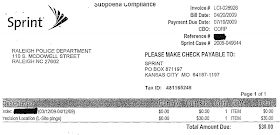"Technological progress poses a threat to privacy by enabling an extent of surveillance that in earlier times would have been prohibitively expensive."
-- US v. Garcia, 474 F. 3d 994 - Court of Appeals, 7th Circuit 2007
In 2009, I attended a surveillance industry trade show (the "wiretapper's ball") in Washington DC where I recorded an executive from Sprint describing, in depth, the location tracking capabilities his company provided to law enforcement agencies:
"[M]y major concern is the volume of requests. We have a lot of things that are automated but that's just scratching the surface. One of the things, like with our GPS tool. We turned it on the web interface for law enforcement about one year ago last month, and we just passed 8 million requests. So there is no way on earth my team could have handled 8 million requests from law enforcement, just for GPS alone. So the tool has just really caught on fire with law enforcement. They also love that it is extremely inexpensive to operate and easy, so, just the sheer volume of requests they anticipate us automating other features, and I just don't know how we'll handle the millions and millions of requests that are going to come in.
-- Paul Taylor, Electronic Surveillance Manager, Sprint Nextel.
The information that I gathered was one of the first real data points revealing the scale and ease with which law enforcement and intelligence agencies can now collect real-time location data from wireless phone carriers. This is because unlike wiretaps, there are no annual statistics produced by the courts that detail the number of location surveillance orders issued each year.
My disclosure of this information led to significant news coverage, but also to a citation from Judge Kozinski of the 9th Circuit, who observed in dissent in U.S. v. Pineda-Moreno that:
When requests for cell phone location information have become so numerous that the telephone company must develop a self-service website so that law enforcement agents can retrieve user data from the comfort of their desks, we can safely say that "such dragnet-type law enforcement practices" are already in use.
ACLU FOIA docs reveal other carriers have followed Sprint's lead
It appears that Sprint is not the only wireless company to provide law enforcement agencies with an easy way to track the location of targets in real-time.
Among the 5500 pages of documents obtained by the ACLU as part of a nationwide FOIA effort, are a few pages from Tucson AZ detailing (or at least hinting at) the real-time location tracking services provided to the government by the major wireless carriers.
AT&T's Electronic Surveillance Fee Schedule reveals that the company offers an "E911 Tool" to government agencies, which it charges $100 to activate, and then $25 per day to use.
While it is no secret that Sprint provides law enforcement agencies subscriber real-time GPS data via its "L-Site" website (read the L-site manual), Sprint's Electronic Surveillance Fee Schedule reveals that the company charges just $30 per month for access to this real-time data.
The documents from T-Mobile provides by far the greatest amount of information about the company's real-time location tracking capabilities. The company's Locator Tool service, which it charges law enforcement agencies $100 per day to access, generates pings at customizable 15 / 30/ 60 minute intervals, after which, the real-time location information is emailed directly to the law enforcement agency.
Unfortunately, Verizon's surveillance pricing sheets do not reveal any information about GPS tracking. It is almost certain that the company does provide real-time location data, but for now, we don't know how it is provided, or at what cost.

No comments:
Post a Comment